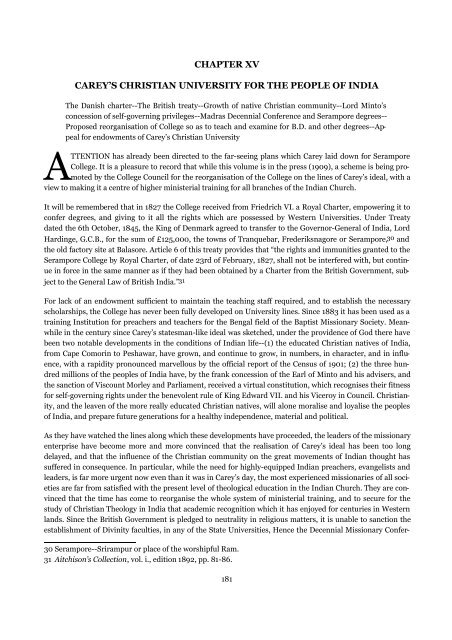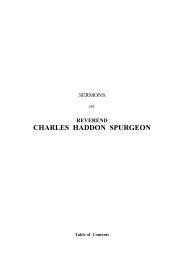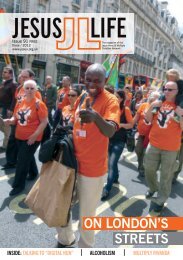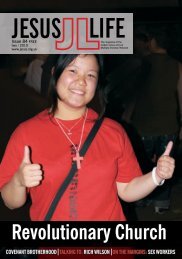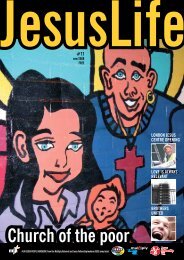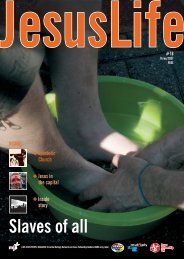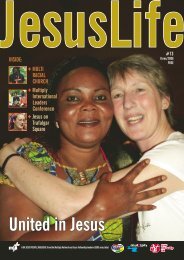Life of William Carey by George Smith - The Jesus Army
Life of William Carey by George Smith - The Jesus Army
Life of William Carey by George Smith - The Jesus Army
You also want an ePaper? Increase the reach of your titles
YUMPU automatically turns print PDFs into web optimized ePapers that Google loves.
CHAPTER XV<br />
CAREY’S CHRISTIAN UNIVERSITY FOR THE PEOPLE OF INDIA<br />
<strong>The</strong> Danish charter--<strong>The</strong> British treaty--Growth <strong>of</strong> native Christian community--Lord Minto’s<br />
concession <strong>of</strong> self-governing privileges--Madras Decennial Conference and Serampore degrees--<br />
Proposed reorganisation <strong>of</strong> College so as to teach and examine for B.D. and other degrees--Appeal<br />
for endowments <strong>of</strong> <strong>Carey</strong>’s Christian University<br />
ATTENTION has already been directed to the far-seeing plans which <strong>Carey</strong> laid down for Serampore<br />
College. It is a pleasure to record that while this volume is in the press (1909), a scheme is being promoted<br />
<strong>by</strong> the College Council for the reorganisation <strong>of</strong> the College on the lines <strong>of</strong> <strong>Carey</strong>’s ideal, with a<br />
view to making it a centre <strong>of</strong> higher ministerial training for all branches <strong>of</strong> the Indian Church.<br />
It will be remembered that in 1827 the College received from Friedrich VI. a Royal Charter, empowering it to<br />
confer degrees, and giving to it all the rights which are possessed <strong>by</strong> Western Universities. Under Treaty<br />
dated the 6th October, 1845, the King <strong>of</strong> Denmark agreed to transfer to the Governor-General <strong>of</strong> India, Lord<br />
Hardinge, G.C.B., for the sum <strong>of</strong> £125,000, the towns <strong>of</strong> Tranquebar, Frederiksnagore or Serampore, 30 and<br />
the old factory site at Balasore. Article 6 <strong>of</strong> this treaty provides that “the rights and immunities granted to the<br />
Serampore College <strong>by</strong> Royal Charter, <strong>of</strong> date 23rd <strong>of</strong> February, 1827, shall not be interfered with, but continue<br />
in force in the same manner as if they had been obtained <strong>by</strong> a Charter from the British Government, subject<br />
to the General Law <strong>of</strong> British India.” 31<br />
For lack <strong>of</strong> an endowment sufficient to maintain the teaching staff required, and to establish the necessary<br />
scholarships, the College has never been fully developed on University lines. Since 1883 it has been used as a<br />
training Institution for preachers and teachers for the Bengal field <strong>of</strong> the Baptist Missionary Society. Meanwhile<br />
in the century since <strong>Carey</strong>’s statesman-like ideal was sketched, under the providence <strong>of</strong> God there have<br />
been two notable developments in the conditions <strong>of</strong> Indian life--(1) the educated Christian natives <strong>of</strong> India,<br />
from Cape Comorin to Peshawar, have grown, and continue to grow, in numbers, in character, and in influence,<br />
with a rapidity pronounced marvellous <strong>by</strong> the <strong>of</strong>ficial report <strong>of</strong> the Census <strong>of</strong> 1901; (2) the three hundred<br />
millions <strong>of</strong> the peoples <strong>of</strong> India have, <strong>by</strong> the frank concession <strong>of</strong> the Earl <strong>of</strong> Minto and his advisers, and<br />
the sanction <strong>of</strong> Viscount Morley and Parliament, received a virtual constitution, which recognises their fitness<br />
for self-governing rights under the benevolent rule <strong>of</strong> King Edward VII. and his Viceroy in Council. Christianity,<br />
and the leaven <strong>of</strong> the more really educated Christian natives, will alone moralise and loyalise the peoples<br />
<strong>of</strong> India, and prepare future generations for a healthy independence, material and political.<br />
As they have watched the lines along which these developments have proceeded, the leaders <strong>of</strong> the missionary<br />
enterprise have become more and more convinced that the realisation <strong>of</strong> <strong>Carey</strong>’s ideal has been too long<br />
delayed, and that the influence <strong>of</strong> the Christian community on the great movements <strong>of</strong> Indian thought has<br />
suffered in consequence. In particular, while the need for highly-equipped Indian preachers, evangelists and<br />
leaders, is far more urgent now even than it was in <strong>Carey</strong>’s day, the most experienced missionaries <strong>of</strong> all societies<br />
are far from satisfied with the present level <strong>of</strong> theological education in the Indian Church. <strong>The</strong>y are convinced<br />
that the time has come to reorganise the whole system <strong>of</strong> ministerial training, and to secure for the<br />
study <strong>of</strong> Christian <strong>The</strong>ology in India that academic recognition which it has enjoyed for centuries in Western<br />
lands. Since the British Government is pledged to neutrality in religious matters, it is unable to sanction the<br />
establishment <strong>of</strong> Divinity faculties, in any <strong>of</strong> the State Universities, Hence the Decennial Missionary Confer-<br />
30 Serampore--Srirampur or place <strong>of</strong> the worshipful Ram.<br />
31 Aitchison’s Collection, vol. i., edition 1892, pp. 81-86.<br />
181


